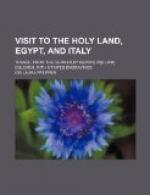There is a theatre in Pera, which will hold from six to seven hundred spectators. At the time of my sojourn there, a company of Italian singers were giving four representations every week. Operas of the most celebrated masters were here to be heard; but I attended one representation, and had quite enough. The wonder is that such an undertaking answers at all, as the Turks have no taste for music, and the Franks are too fastidious to be easily satisfied.
The carriages—which are, generally speaking, only used by women— are of two kinds. The first is in the shape of a balloon, finely painted and gilt, and furnished with high wheels. On each side is an opening, to enter which the passenger mounts on a wooden stool, placed there by the coachman every time he ascends or descends. The windows or openings can be closed with Venetian blinds. These carriages contain neither seats nor cushion. Every one who drives out takes carpets or bolsters with him, spreads them out inside the coach, and sits down cross-legged. A carriage of this description will hold four persons. The second species of carriage only differs from that already described in having still higher wheels, and consisting of a kind of square box, covered in at the top, but open on all sides. The passengers enter at the back, and there is generally room for eight persons. The former kind of vehicle is drawn by one horse in shafts, and sometimes by two; the latter by one or two oxen, also harnessed in shafts, which are, however, furnished in addition with a wooden arch decorated with flowers, coloured paper, and ribbons. The coachman walks on foot beside his cattle, to guide them with greater security through the uneven ill-paved streets, in which you are continually either ascending or descending a hill.
Wagons there are none; every thing is carried either by men, horses, or asses. This circumstance explains the fact that more porters are found here than in any other city. These men are agile and very strong; a porter often bears a load of from one hundred to a hundred and fifty pounds through the rugged hilly streets. Wood, coals, provisions, and building-materials are carried by horses and asses. This may be one reason why every thing is so dear in Constantinople.
CHAPTER IV.
Walks and drives of the townspeople—The “Sweet Waters”— Chalcedonia—Baluklid—The great and little Campo—Feasts in Constantinople—Anniversary of Mahomet’s death—Easter holidays of the Greeks—Gladiators and wrestlers—Excursion to Brussa—Olive-trees—Mosques at Brussa—Stone bridge—Wild dogs—Baths and mineral springs—Return to Constantinople.
On Sundays and holydays the “Sweet Waters” of Europe are much frequented. One generally crosses the Golden Horn, into which the sweet water runs, in a kaik. There is, however, another way thither across the mountains.
A large grass-plat, surrounded by trees, is the goal towards which the heaving multitude pours. Here are to be seen people from all quarters of the globe, and of all shades of colour, reclining in perfect harmony on carpets, mats, and pillows, and solacing themselves, pipe in mouth, with coffee and sweetmeats. Many pretty Jewesses, mostly unveiled, are to be seen among the crowd.




